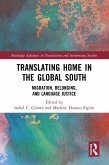How can democratization, coupled with transnational integration, resolve conflicts over cultural difference in places that are marked by legacies of nationalist competition? This book explores that question through a comparative study of contestations over language use in the heart of the post-Communist region. Zsuzsa Csergo notes that newly independent governments looked to "rejoin" the West, in particular the European Union, while at the same time asserting control over the institutions they considered key to the reproduction of national cultures. These national projects resulted in renewed salience for minority language rights and a complicated politics triggering EU concerns about the treatment of regional/cultural minorities. Csergo's field research in Romania, Hungary, and Slovakia leads her to make a bold claim about the primacy of domestic politics in the construction of democratic solutions to the conundrum of nation building and minority rights.Talk of the Nation breaks new ground by focusing on both majority and minority political elites and parties in interethnic relations. Csergo challenges arguments about the overwhelming importance of international influence. Her book demonstrates that the role of domestic political actors in interethnic reconciliation is not merely that of "compliance" with international requirements or "effectiveness" in responding to external pressure-they are largely guided by the internal democratic process.
Dieser Download kann aus rechtlichen Gründen nur mit Rechnungsadresse in A, D ausgeliefert werden.









